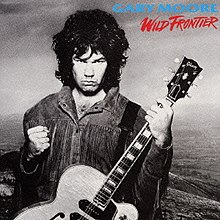This article needs additional citations for verification. (June 2018) |
| Wild Frontier | ||||
|---|---|---|---|---|
 | ||||
| Studio album by | ||||
| Released | 2 March 1987 | |||
| Genre | Pop metal[1] | |||
| Length | 37:20 | |||
| Label | 10/Virgin | |||
| Producer | Peter Collins, Pete Smith, James "Jimbo" Barton, Gary Moore | |||
| Gary Moore chronology | ||||
| ||||
| Singles from Wild Frontier | ||||
| ||||
| Review scores | |
|---|---|
| Source | Rating |
| AllMusic | |
| Collector's Guide to Heavy Metal | 4/10[8] |
Wild Frontier is the sixth solo studio album by Northern Irish guitarist Gary Moore, released on 2 March 1987.[9] His first studio effort after a 1985 trip back to his native Belfast, Northern Ireland, the album contains several songs about Ireland. The album is dedicated to the memory of Moore's close friend and former Thin Lizzy bandmate Phil Lynott, who died on 4 January 1986, with the words "For Philip" on the rear cover.
Wild Frontier contains the hit single "Over the Hills and Far Away", which reached No. 20 in the UK,[10] as well as a cover of the Easybeats' song "Friday on My Mind". The Max Middleton-penned "The Loner" was originally recorded by Cozy Powell for his Over the Top album in 1979 (on which Moore performed, albeit not on Powell's recording of "The Loner"). The track was substantially altered by Moore for his own recording, thus he is credited as a co-writer. The song "Crying in the Shadows", which was released as the B-side of the "Over the Hills and Far Away" single in December 1986 and appears as a bonus track on the CD version of Wild Frontier, was also recorded by Japanese singer Minako Honda, titled "The Cross (Ai No Jujika)", with Moore on guitar.
Gary Moore was joined by The Chieftains on select tracks from this album.[11][12][13]
All drums on Wild Frontier are sequenced with a drum machine, which AllMusic described as Moore's "most fatal" decision, leading to a "disappointing" album.[1]
- ^ a b Rivadavia, Eduardo. "Gary Moore - Wild Frontier Review". AllMusic. Retrieved 4 October 2021.
- ^ "Music Week" (PDF). p. 40.
- ^ "Music Week" (PDF). p. 13.
- ^ "New Singles". Music Week. 25 April 1987. p. 13.
- ^ "Music Week" (PDF). p. 39.
- ^ "Music Week" (PDF). p. 49.
- ^ Rivadavia, Eduardo. Wild Frontier at AllMusic
- ^ Popoff, Martin (1 November 2005). The Collector's Guide to Heavy Metal: Volume 2: The Eighties. Burlington, Ontario, Canada: Collector's Guide Publishing. p. 230. ISBN 978-1-894959-31-5.
- ^ "Brit certifications for Gary Moore".
- ^ "Gary Moore Official Charts". Official Charts Company. Retrieved 9 June 2018.
- ^ "Chieftains, Tops in Irish Folk Music, Celebrate Their Silver Anniversary". Los Angeles Times. 24 March 1988. Retrieved 25 April 2022.
- ^ Wonderlea, Harold Mac; published, Christine Rebmann (15 September 2011). "Gary Moore Discusses His Latest Album, Gear and Phil Lynott in 1987 Guitar World Interview". guitarworld. Retrieved 25 April 2022.
- ^ Himes, Geoffrey (21 August 1987). "MOORE'S MAGIC ROCK ANTHEMS". Washington Post. ISSN 0190-8286. Retrieved 25 April 2022.